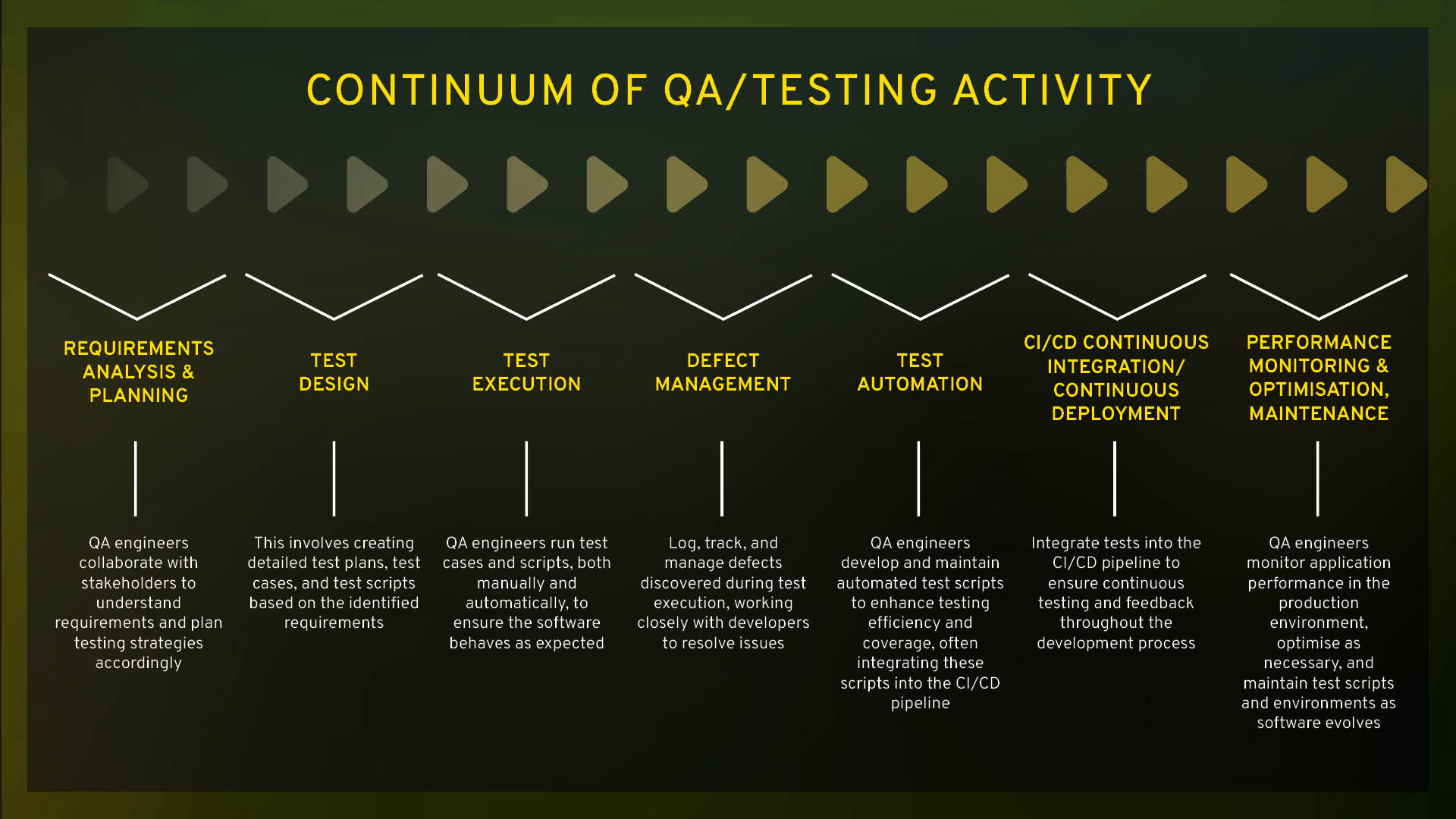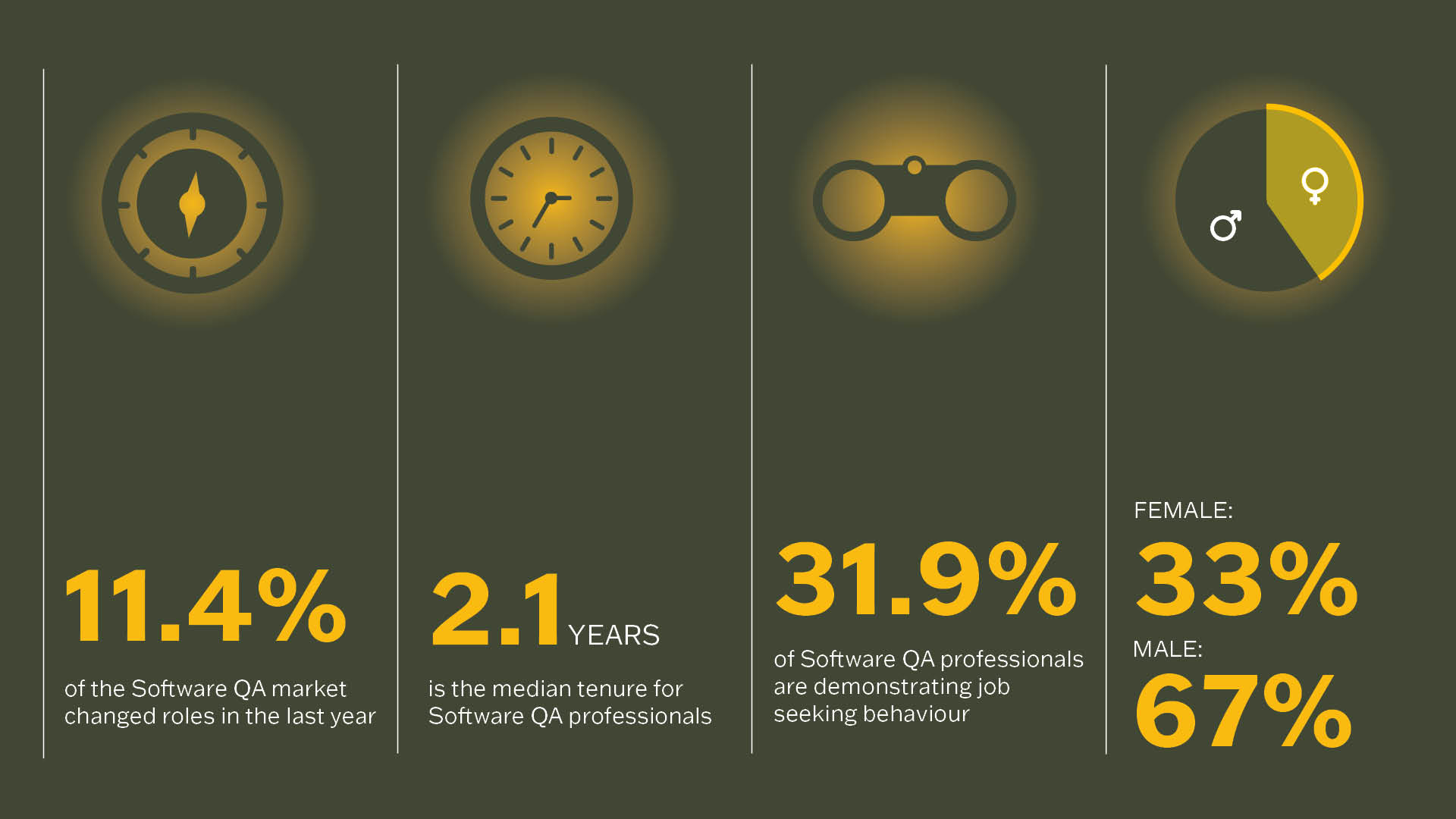Ireland remains a hub for multinational tech companies while also supporting a growing number of local start-ups. In this expanding market, software testing plays a critical role in ensuring products function reliably and meet user expectations.
Drawing on conversations with Software QA Engineers across the industry, we examine key trends, insights, and the factors shaping Ireland’s QA landscape.
#1 Software QA Landscape
A Software QA Engineer’s role involves a continuum of activities, from planning and designing tests to executing them, as well as performance monitoring and maintenance. The balance of these activities can vary depending on the project, team, or organisation, as shown in the image below.
Key points along this continuum include:

#2 Factors Influencing QA Roles
Job titles in Software QA and Test Automation can be misleading without context – they don’t fully capture one’s role or market value. This is influenced by several factors, reflecting the role’s scope and diversity of experience. Here are some that tend to matter most:
1. Team and Company Size:
In smaller teams, testers often take on broader responsibilities across multiple testing domains. For example, in a multinational firm, a Software QA Engineer might focus on performance testing for a specific product line. In a start-up, the same role could encompass performance, security, and usability testing across all products.
In larger organisations, effective communication and teamwork become increasingly critical for Software QA teams, as they collaborate with more developers, product managers, and other stakeholders to navigate complex cross-functional dynamics
2. Scope of Responsibilities:
Experience and seniority further shape the role. Junior and mid-level QA Engineers typically focus on hands-on testing, while senior engineers gradually take on more strategic and leadership responsibilities – a progression that depends on both company size and team growth. For example, a Senior QA Engineer transitioning into a Test Lead role gains market value not only through technical expertise but also by guiding testing efforts across complex projects. In larger teams, Test Leads often mentor multiple engineers, manage workflows, and provide oversight for critical projects, expanding both the depth and breadth of their responsibilities.
3. Project Complexity and Automation:
As projects grow in complexity, so do the testing strategies required. Larger initiatives often rely on robust automation frameworks, making proficiency in tools like Selenium, Appium, Jenkins, and TestNG highly valuable. Most automation testers specialise in a limited set of tools, given their depth and complexity. In contrast, those with only manual testing experience may find fewer opportunities as automation becomes more widespread. As of Q3 2025, low-code/no-code testing tools are gaining traction
4. Cloud Technologies and Testing:
Cloud platforms offer scalable and flexible testing environments that are integral to modern QA practices. Experience with leading providers like AWS, Azure, and Google Cloud – especially when it comes to testing distributed systems and serverless architectures – is highly valuable. Those who are also skilled in cloud-specific testing, such as API and microservices testing, bring added versatility and impact to their teams.
5. Web and Mobile Apps:
Software QA Engineers in Ireland who are skilled in both web and mobile testing provide substantial value to organisations offering multi-platform products. For companies with mobile apps, they can ensure seamless user experiences across platforms, quickly identify cross-device issues, and support faster release cycles. Mobile app testing isn’t just “nice to have” – it’s often a critical part of compliance, quality, and user retention.
In summary, a Software QA Engineer’s value is shaped by how effectively they navigate variables like those discussed above. Proficiency in automation, cloud technologies, and diverse testing environments not only broadens their scope but also strengthens their position in the market.
#3 Base Salary
Due to the wide range of variables discussed in Section 2, it can be misleading to use fixed salary ranges. Understanding the specific context of each role is essential, as factors such as company size, industry, location, and market demand (e.g., niche skill sets) all play a part.
Engineers with advanced skills in areas such as automation or cloud testing are particularly sought after.
Here are some examples of recently completed assignments:
- Dublin – Software Test Lead (Mobile Apps & Cloud): €115,000
- Munster – QA Manager: €95,000
- Dublin – Senior Test Automation Engineer: €90,000
- Munster – Mid-level QA Engineer: €50,000
If you’d like to discuss a salary range tailored to your role and location, please contact Rachel at rachel.mcguckian@barden.ie for a confidential discussion.
#4 Current Snapshot of the Software QA Talent Pool
Here’s what we’ve noticed this quarter in the Software QA talent pool in Ireland:

#5 Projected Challenges for the Next 6 Months
For Employers:
- AI Integration: As AI becomes embedded in more products, employers face the challenge of ensuring their QA teams can validate AI-driven systems while also adopting AI-assisted testing tools effectively.
- Full-Lifecycle Testing: Shift-left testing remains a core best practice for catching issues early in development, but testing in production (shift-right) is becoming more important. QA teams must balance both approaches to ensure quality throughout the entire SDLC. How these practices are applied depends on factors like industry needs, release speed, and risk tolerance.
- Security and Performance: Regulatory demands and user expectations mean performance and security testing can no longer be optional. Building QA teams with baseline expertise in these areas is critical.
- Cloud-Native Testing: The rise of cloud technologies means QA teams must adapt to testing in dynamic, distributed environments like microservices and serverless architectures. Employers face challenges ensuring test automation and monitoring tools effectively cover these complex systems.
For Talent:
- AI and Automation Upskilling: QA engineers will need to actively learn and apply emerging tools and techniques – particularly in AI-assisted testing, prompt engineering, and continuous test automation.
- Broader Responsibilities: As QA roles expand across pre- and post-release phases, testers are expected to work more cross-functionally with development, DevOps, and data science teams – requiring both technical versatility and soft skills.
- Cloud Skills and Testing: QA engineers should actively seek opportunities – whether through work projects, training, or self-learning – to build expertise in cloud platforms and cloud-native testing methods such as containerised testing, API testing for microservices, and automated monitoring. Building these skills is crucial to keep pace with the rising demand for cloud-based testing, even if a current role does not fully leverage them.
#6 What Should Companies Focus on When Hiring QA Talent in 2025/2026
- Hybrid Work: QA engineers continue to prefer flexible working arrangements, with 1-3 days in the office per week being the norm. Mandating more on-site days risks losing top talent, especially for geographically dispersed teams.
- Contractors & Niche Skills: For specialised QA roles – cloud, AI-assisted testing – companies may need to look beyond Ireland. Contractors from other EU countries are increasingly filling these gaps, often remotely.
- Upskilling & Continuous Learning: QA professionals who invest in ongoing learning – automation, cloud platforms, AI tools, performance/security testing – bring the most value. Companies should support training to retain talent and stay ahead of the curve.
In Barden, we understand that each team, role, and requirement is unique. If you would like to discuss what tactics and approaches would suit you, please feel free to contact Rachel McGuckian, our Software QA Talent Advisor & Recruiter here in Barden (rachel.mcguckian@barden.ie); we’re where leaders go before they start looking for Software QA talent.
This information is accurate as per January 2026 and will be updated periodically. Data sources include Barden Proprietary Data, LinkedIn Analytics and other 3rd party data sources.


 Jump Back
Jump Back

